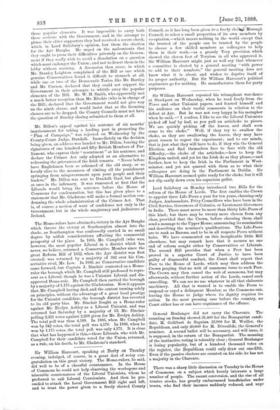Lord Salisbury on Monday introduced two Bills for the reform
of the House of Lords. The first enables the Crown to appoint three Life-Peers a year for ten years, choosing only Judges, Ambassadors, Privy Councillors who have been in the Civil Service, Governors of Colonies, or Lieutenant-Governors in India. There must never be more than thirty Life-Peers of this kind ; but there may be twenty more chosen from any class, provided that the Crown, before choosing them, shall send a message to the Upper House, announcing its nomination and describing the nominee's qualifications. The Life-Peers are to rank as Barons, and to be in all respects Peers without heirs. We have commented on this inexplicable little Bill elsewhere, but may remark here that it secures no one end of reform sought either by Conservatives or Liberals. The second Bill provides that when a Peer has been proved in a superior Court of Justice to have been guilty of disgraceful conduct, the Court shall report that Peer to the House of Lords, which may then address the Crown praying that no writ of summons issue to such Peer. The Crown may then cancel the writ of summons, but may afterwards, without further action of the Lords, cancel such cancelling. We can see no use whatever in all that elaborate machinery. All that is wanted is to enable the Peers to suspend or expel a delinquent Member, as the Commons can, leaving the House to judge where its dignity requires its action. In the most pressing case before the country, no Court either has or can have cognisance of the offence.






































 Previous page
Previous page